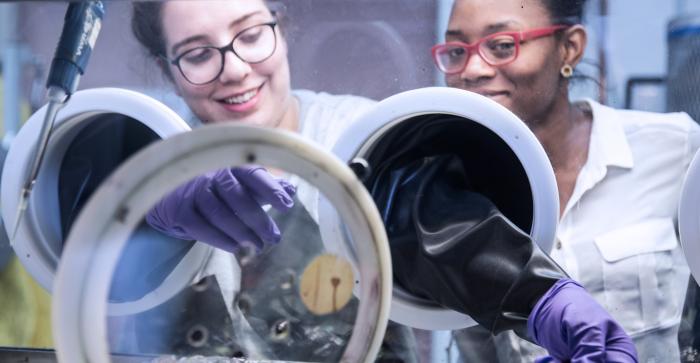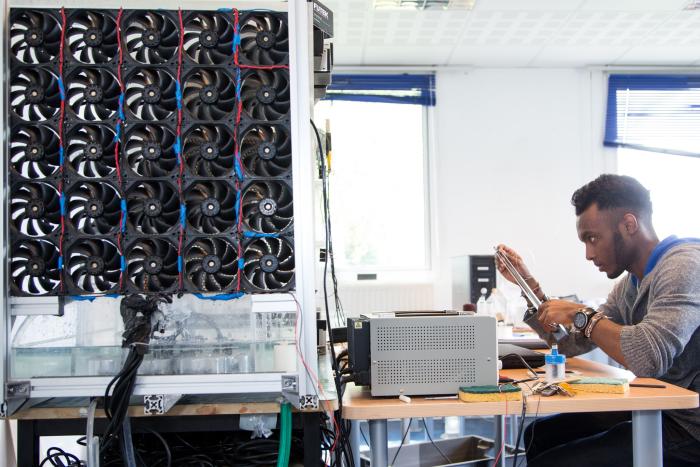Please consult the Institut Polytechnique de Paris website for more information about the programs
Program Overview
Ecole Polytechnique offers a five-year program designed for outstanding students of all nationalities. The Program involves a combination of an MSc (2 years) and a PhD (3 years).
Starting from the first year of the program, students work closely with academic tutors who will oversee their progress and help customize their training with regards to their own interests and goals. Affiliation to Ecole polytechnique is required during most of the program.
Institut Polytechnique de Paris is a newly created institution, which unites five established and prestigious graduate engineering schools: Ecole Polytechnique, ENSTA Paris, ENSAE Paris, Télécom Paris and Télécom SudParis, who share the ambition to create a world-class institution of higher education.
The graduate programs offer a wide range of courses in Mathematics, Computer Science, Chemistry, Economics, Energy, Mechanics, Innovative Industry and their applications in Data Science, Finance, Biological Sciences, Physics and many other related fields. English is the language of instruction for the majority of our courses.
The campus of Institut Polytechnique de Paris is located in Palaiseau, in the heart of one of the world’s top 10 Industry and Innovation Clusters.
Please consult the Institut Polytechnique de Paris website for more information about the programs.
Registration is open! Click here to apply to IP Paris Programs

The first two years of the Program are based on a custom selection of taught modules and lab experience, giving students the tools required to continue with a challenging three-year long-term research project, leading ultimately to a PhD degree.
While the Program is rather demanding, students have the flexibility to define their own goals and research interests within their chosen discipline during the first two years.
Students may also have the possibility to start the PhD Program in the second year of the MSc (4-year PhD program). In either case, progression to PhD study requires successful completion of the MSc.
- At the end of the fall term students are required to submit a mid-year progress report and, with their tutor, define a research project and choose a lab and a team.
- A progress meeting and discussion of the study plan are held at the end of each year. Students may leave the PhD Program after Years 1 or 2 for personal or academic reasons; in this latter case, they may complete the Master's Program.
- Students are expected to complete an intensive research internship at the end of Years 1 and 2 of the Program.
- During this period, at least one year must be spent teaching, participating in a scientific outreach program or consulting for industry.
- There are annual progress reports at the end of Years 3 and 4, plus a provisional timeline for Year 5 drawn up at the end of Year 4.
- Students complete a written dissertation demonstrating the results of original research that meet the requirements for a PhD.
- Students must also successfully complete an oral defense of their PhD research.
Students involved in the PhD Program benefit from the attention and expertise of renowned experts in the following areas of research:
- Partial Differential Equations | - Applications in Mechanics and Physics |
- Biology and Interfaces
- Molecular Chemistry
- Chemistry of Materials
| - Algorithms - Complexity - Combinatorics - Constraints and Optimization - Bioinformatics - Concurrent and Distributed Systems | - Security and Networks - Control (Hybrid) and Cyberphysical Systems - Symbolic Computation - Proofs and Types - Verification |
| - Microeconomics - Macroeconomics - Econometrics - Financial Economics - Economic Theory - Experimental Economics - Behavioral Economics | - Game Theory - Industrial Organization - International Trade - Spatial Economics - Public Economics - Public Finance - Labor Economics |
Innovation Management and Entrepreneurship
- History of Science and Technology
- Business and Corporate History
- Political Science
- Ethics and Philosophy
- Literature and Science
- Cultures and Globalization
- Fluid and Solid Mechanics
- Environmental and Geophysical Science
- Bio-mechanics
- Physics of the Two Infinities
- High-energy Physics
- Optics, Lasers, and Plasmas
- Nanoscience, Nanotechnology, Information, and Communications
- Condensed Matter
- Materials
- Energy
- Algebra and Number Theory
- Analysis and Partial Differential Equations
- Geometry and Dynamical Systems

Laboratories
The Research Center comprises 23 laboratories:
- BIOC - Biochemistry Laboratory
- CMAP - Applied Mathematics Center
- CMLS - Laurent Schwartz Mathematics Center
- CPHT - Theoretical Physics Center
- IPVF - The Institut Photovoltaïque d’Île-de-France
- LSO - Organic Synthesis Laboratory
- LADHYX - Hydrodynamics
- LCM - Molecular Chemistry Laboratory
- LIX - Computer Science Laboratory
- LLR - Leprince-Ringuet Laboratory for Particle Physics and Astrophysics
- LMD - Dynamic Meteorology Laboratory
- LMS - Solids Mechanics Laboratory
- LOA - Applied Optics Laboratory
- LOB - Optics and Bioscience
- LPP - Plasma Physics Laboratory
- LSI - Irradiated Solids
- LULI - Intense Lasers Laboratory
- PICM - Physics of Interfaces
- PMC - Condensed Matter Physics
- EXCESS Laboratory (ENSAE-X Center in Economics, Statistics and Sociology)
- I³ - CRG Center for Management Studies
- Omega
- LinX - Laboratoire Interdisciplinaire de l'X
- Annual registration fees: €256 (rate applicable in 2017-18)
- Annual compulsory social security fees: €217 (rate applicable in 2017-18)
An annual scholarship of €8,000 minimum, funded by the “Ecole Polytechnique Foundation”, may be granted to the best applicants.
Academic ability: Applicants are chosen according to the excellence of their academic qualifications (Licence, bachelor's or equivalent qualification) in a relevant discipline.
During the first two years of the program, students hold the status of master's student. They then obtain PhD candidate status upon successful completion of their master's degree with distinction. Students wishing to continue in the PhD program must submit a formal application after completion of the Master's Program.
Applications for the 2019 intake are now closed.
Applications for the Fall 2020 intake will open in January 2020.
- Applicants should demonstrate their strong interest in research in a written personal statement.
- Two letters of recommendation from renowned academics supporting the application (motivation and suitability for research) are required.
- The application includes an interview to evaluate students’ academic abilities, research interests and motivation.
- Final admission into the Program is dependent on the fulfillment of the university's admission rules for an MSc.
- Shortlisted applicants are assigned a tutor who helps define a provisional five-year study plan. (This may be done via videoconference, however face-to-face meetings are preferred.)